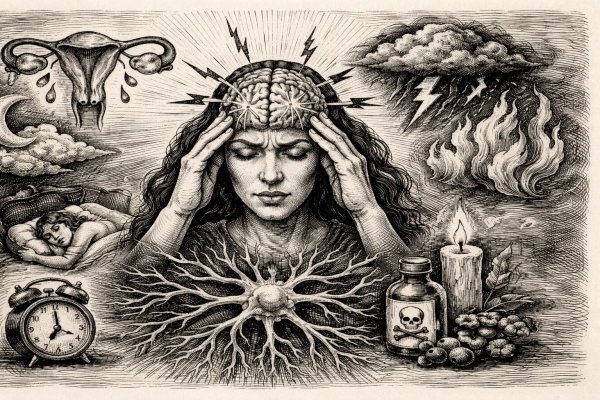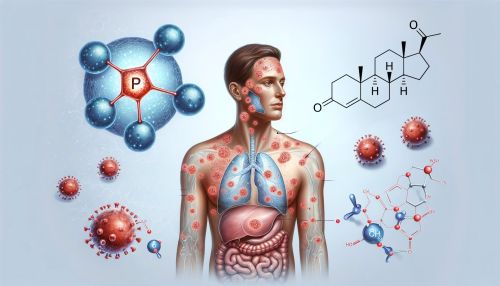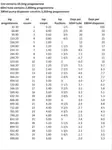Signs of infertility
There are many factors that contribute to the signs of infertility. Some of them are...
- a lack of progesterone
- a lack of vitamin D
- high oestrogen and/or testosterone
- high FSH (follicle stimulating hormone)
- high LH (luteinising hormone)
- oxidative stress due to a lack of antioxidants
- contraceptives which can cause the ovaries to malfunction after discontinuing
- stress, emotional, mental or physical
- endometriosis
- environmental toxins, particularly oestrogen mimics
- being overweight
- being underweight, particularly caused by a lack of good fats and oils
- a deficient diet leading to malnutrition
- low sperm counts or abnormal sperm
- poly cystic ovaries/cystic ovaries
- diabetes
- hyperprolactinemia
- thyroid disorders
One of the least known but commonest signs of infertility is a lack of progesterone during the second half of the monthly cycle. This is known as a 'defective luteal phase'.
During the first half of the Menstruation Cycle, oestrogen stimulates the lining of the uterus to develop. This is known as the follicular or proliferativestage.
Once ovulation has taken place, and progesterone is being secreted by the corpus luteum, it causes the lining to thicken ready for the fertilised egg. The second half of the menstrual cycle is known as the luteal or differentiation phase, and should last 12 to 14 days.
Progesterone is vital for pregnancy, but if the interval between ovulation and menstruation is too short (less than 12 days) it means inadequate progesterone has been produced.
Research into the causes and signs of infertility has shown that often conception occurs in a fertile woman to be followed by failure of the egg to embed itself in the lining. This could result in a miscarriage as early as the next menstruation.
So fertility could be high, but with low progesterone it appears as if the woman is infertile.
The only sign of miscarriage might be a heavier period, clots and/or pain. The reason for this is that the egg takes about 12-14 days to reach the uterus, but unless the corpus luteum maintains a high level of progesterone during this time, menstruation will occur before the egg is embedded. In these cases the condition is easily corrected by supplementing with progesterone to extend the luteal phase.
Another of the signs of infertility is the anovulatory cycle, in which a woman does not ovulate. This is common in women from their mid-thirties, but research has found that increasingly younger women are also suffering from these cycles.
There are various causes for this. Excessive FSH which stimulates the ovaries to make too much oestrogen and testosterone, plus excessive LH. These four hormones if in excess prevent ovulation and therefore the production of progesterone. It could possibly be due to the excessive use of contraceptives or stress.
Contraceptives can result in temporary infertility after stopping them. They are designed to stop ovulation. But once the contraceptives have been stopped the ovaries can start up again.
Initially the ovaries make oestrogen and testosterone, but it can be many cycles later before the ovaries start ovulating. If too high a level of oestrogen and testosterone are produced, this causes a severe imbalance in the ovaries and anovulation results. Supplementing with progesterone suppresses the excess oestrogen and testosterone, and helps regulate the cycle.
Excess stress raises cortisol levels and drops progesterone levels (both potential signs of infertility). The adrenals produce progesterone before converting it into cortisol. If the adrenals are exhausted, they will rob other sources of progesterone, notably ovarian. This impacts on the reproductive cycle. Stress can cause anovulation and miscarriages.
Stress is also known to inhibit the release of FSH and LH, leading to impaired development of an egg/s. Because synthesis of progesterone is increased after ovulation, stress induced impairment of egg development could potentially alter progesterone synthesis and release.
Progesterone is excellent for stress, as it activates the GABA receptor sites. GABA is one of the most calming neurotransmitters.
Often the cause behind anovulation is oxidative stress.
A lack of vitamin D causes oxidative stress to the ovaries which results in them malfunctioning, it's essential to have a test done. Vitamin D is also essential for the developing foetus.
Oxidative stress can also be due to a lack of other antioxidants. This is particularly common if processed foods are eaten as these lack antioxidants.
Endometriosis is caused by oxidative stress and excess oestrogen, leading to severe inflammation (one of the clear signs of infertility). This poses major problems to any egg trying to embed in the endometrium. High levels of progesterone are needed to reverse it. Please see the page on Endometriosis.
Hormone imbalances induced by environmental toxins are another factor. There are now over 100 oestrogen mimics on the planet, please see the website Our Stolen Future. Unfortunately the problems can stem from in utero, when the developing foetus is subjected to the toxins. Males are particularly prone to the effects of oestrogen at this stage. Supplemental progesterone is essential as it suppresses this excess oestrogen.
Overweight women have a lower chance of conceiving (excessive weight being one of the more common signs of infertility). The adrenal glands make (amongst many other hormones) androstenedione. This can be converted by fat cells into oestrone, one of the oestrogens. This increases oestrogen levels which causes an imbalance in hormone levels. Supplementing with progesterone will counteract this excess oestrone.
One of the commonest impending signs of infertility is low body-fat. It is vital for a woman to keep her body-fat above 20% of her total weight, otherwise she will stop menstruating. It is also essential to make sure sufficient good fats and oils are consumed.
A diet deficient in the good fats and oils, plus insufficient good quality protein, leads to malnutrition. This is turn leads to malfunctioning ovaries. Please see the page on Nutrition and Diet.
Prolactin, although originally known as the hormone of lactogenisis, has now been found to be an inflammatory hormone. A lack of protein can lead to hyperprolactinemia, due to insufficient tyrosine in the diet. This amino acid is the precursor to dopamine. Prolactin increases with high oestrogen levels and low dopamine levels. Like oestrogen, it also suppresses progesterone if in excess. Supplemental progesterone suppresses both oestrogen and prolactin. Supplemental tyrosine will increase dopamine levels.
Another of the signs of infertility, hypopituitarism, although a rare problem, can lead to low FSH and LH. This is turn will prevent follicles maturing and ovulating. The possible anovulation means no progesterone will be produced.
Low sperm counts or abnormal sperm in the man may also be a sign of infertility. Zinc deficiency can result in small sex organs and late sexual maturation in men. A high level of zinc is found in the male sex organs and the sperm itself.
Progesterone is needed for the acrosome reaction in sperm, low progesterone levels would stop this occurring. This would prevent the sperm entering the egg and fertilising it. There is strong evidence progesterone is involved in the sexual response in males. It also increases libido, and can correct erectile dysfunction.
A manganese deficient diet can lead to defective ovulation, testicular degeneration and infant mortality.
PCOS, or poly cystic ovaries is an increasing problem worldwide and one of the most common signs of infertility. Anovulation is a frequent occurrence, leading to potential problems in conceiving and carrying a child. Oxidative stress is behind PCOS, the antioxidants are essential, in particular vitamin D. This has successfully reversed PCOS in a number of women. In all likelihood, the avoidance of the sun or the use of sunscreens has contributed, if not the direct cause of the increase in cases.
Diabetes prior to falling pregnant can cause miscarriages and birth defects, due to high blood glucose. It also significantly reduces the relaxing affect progesterone has on placental blood vessels. This alteration may lead to a reduction of placental blood flow adversely affecting the foetus.
A healthy thyroid is essential. Both hyperthyroidism and hypothyroidism, can have a direct effect on ovarian function. Often a malfunctioning thyroid is a sign of vitamin D deficiency, and/or a lack of iodine. This is essential, as a mother lacking iodine leads to goitre formation and neuropsycho-intellectual impairment in the child.
Other problems which may be signs of infertility are adrenal disease, venereal diseases, age, genetic factors and tubal blockage.
Natural treatments for signs of infertility
Progesterone is essential if the infertility is caused by a defective luteal phase, or excess oestrogen, testosterone, FSH or LH is present.
100-200mg/day should be used, dependant on symptoms.
For more information please see the web page on Pregnancy.
Please be aware Oestrogen Dominance can occur when first using progesterone.
Have a vitamin D test done. Blood levels should be 70-100ng/ml or 175-250nmol/L and not the 30ng/ml or 75nmol/L most labs and doctors regard as adequate. And the minimum daily dose should be 5000iu's per day, although a 2011 study indicates it should be 10,000iu's per day, see here.
For more info on levels, testing etc see...
GrassrootsHealth
Birmingham Hospital
Vitamin D Links
This is an excellent video to watch on the subject...
Consider taking high doses of other antioxidants, a list is given on the PCOS page.
If overweight or underweight, see the page on Nutrition. The good fats and oils are a vital part of any diet, increase these if intake is low, or on a no-fat/low fat diet.
Eat sufficient protein, it's needed for the growth of the foetus. A malnourished mother will cause the child to be malnourished.
If stressed, see the page on Anxiety.
If diabetes is present see the page on Insulin Resistance.
Zinc is vital for fertility, have a hair analysis done if a deficiency is suspected. See Trace Elements.
If prolactin is high consider taking the amino acid tyrosine.
Check for an iodine deficiency.
 Migraines aren’t just intense headaches — they’re a systemic neurological crisis that disrupts your senses, drains your energy, and derails your life. What most people don’t realize is that women are…
Migraines aren’t just intense headaches — they’re a systemic neurological crisis that disrupts your senses, drains your energy, and derails your life. What most people don’t realize is that women are… Psoriasis is commonly seen as a skin problem — red, scaly patches that itch and flare without warning — but research shows the real driver may be hormonal imbalance deep inside the body, especially lo…
Psoriasis is commonly seen as a skin problem — red, scaly patches that itch and flare without warning — but research shows the real driver may be hormonal imbalance deep inside the body, especially lo… Low libido—whether described as poor sexual desire, low arousal, or hypoactive sexual desire disorder—is a common and complex issue affecting both men and women, shaped by physical, endocrinologic, ne…
Low libido—whether described as poor sexual desire, low arousal, or hypoactive sexual desire disorder—is a common and complex issue affecting both men and women, shaped by physical, endocrinologic, ne…